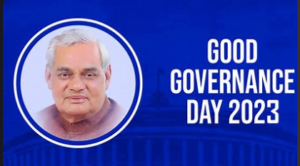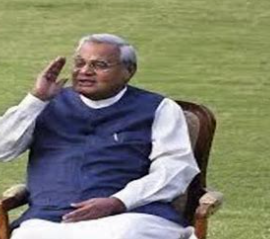Good Governance Day, observed every year on December 25th, is a tribute to the principles of transparency, accountability, and efficiency in government processes. This day is of special importance as it coincides with the birth anniversary of one of India’s most esteemed leaders, Atal Bihari Vajpayee. Let’s explore the history, significance, and some notable quotes by the former Prime Minister.

India aspires to become a developed nation by 2047, a century after independence. This goal, though formidable, is achievable with the right mindset and people’s participation. Good Governance Day, celebrated on December 25, reminds us of Atal Bihari Vajpayee’s vision and Sardar Patel’s guidance to civil servants to serve the common man.
Day marked as a tribute to Vajpayee Ji

Good Governance Day was established to honor the contributions of Atal Bihari Vajpayee, who served as India’s Prime Minister from 1998 to 2004. Vajpayee, a true statesman, was renowned for his charismatic leadership, vision for a prosperous India, and commitment to ethical governance. In 2014, the Indian government officially declared December 25th as Good Governance Day to commemorate Vajpayee’s birthday and promote his ideals.
Good governance, a cornerstone of a flourishing democracy, involves responsible and efficient resource management, transparency, and citizen participation. On Good Governance Day, the emphasis is on raising awareness about the importance of accountable governance and inspiring leaders and citizens to contribute to the nation’s development through ethical practices.
About Atal Bihari Vajpayee
Atal Bihari Vajpayee was a prominent figure in Indian politics, known for his inclusive approach, consensus-building ability, and commitment to economic reforms. During his tenure, India made significant progress in infrastructure, technology, and foreign policy. Vajpayee’s leadership style emphasized consensus-building, and he played a crucial role in shaping India’s global position.
Atal Bihari Ji’s Vision of Good Governance
Atal Ji’s vision of good governance was about being people-centric, being accommodative, and governing effectively even in challenging circumstances. His legacy continues to inspire and guide the principles of good governance in India.
1. Atal Ji truly believed that power is a game that will keep shifting from one person to another but the country should survive, and its democracy should survive as he once said, “The game of power is an ongoing process. Governments and political parties will rise and fall, but the survival and thriving of our nation and its democracy is paramount.” during a trust vote in May 1996.
2. Atal Ji believes education is self-discovery, nurturing latent abilities, and fostering a lifelong desire to learn “Education is not just about acquiring specific skills or knowledge. It’s about self-discovery and nurturing one’s intellectual, artistic, and humanistic abilities. The true measure of education is whether it instills a lifelong desire to learn.” – Inaugural speech at the Golden Jubilee Celebrations of the University Grants Commission, December 28, 2002.
3. Atal Ji supports having just enough defense to discourage threats, which led us to conduct these nuclear tests “The Pokhran-2 nuclear tests were not about self-glorification or machismo. Our national policy advocates for minimum and credible deterrence, which is why we decided to conduct these tests.” – In Parliament discussing the 1998 nuclear tests.
4. Atal ji said that we should maintain good relations with neighbors because they can’t be changed “While friends may come and go, neighbors are constant. We must learn to coexist and build strong relationships with them.” – In Parliament, May 2003.
5. Atal Ji said the corruption in the country will never let funds transfer to the needy people. During his speech in Parliament, he talked about what Rajiv Gandhi reportedly said to him, “If I give one rupee for the needy, by the time it reaches them, it gets reduced to 25 paise due to corruption.”
6. Atal Ji wanted the country to overcome distrust, learn from history, progress collectively”We must ensure that every rupee spent on R&D brings greater benefits to our nation. We need to move past our suspicions and rivalries to ensure that our region also benefits from the peace dividend. History should guide us, not shackle us. We need to look forward with a collective approach.” – At the 12th SAARC Summit in Islamabad, January 2004.
7. Atal Ji believed in Shanti and bhaichara ” In India, we are heirs to a great civilization that values peace and brotherhood. We have never been an aggressive or colonizing force in our long history. Today, we are committed to promoting peace, friendship, and cooperation in our region and around the world.” – At the inauguration of the Global Convention on Peace and Non-violence, January 31, 2004.
8. Atal Ji wanted to spread all facilities to the people of the country to conserve culture and skill and educate people “Poverty is not just about lack of money. It encompasses education, healthcare, skill development, political participation, access to natural resources, clean water and air, and the ability to preserve one’s culture and social organization.” – At the 58th Session of the UN General Assembly, September 25, 2003.
Good Governance Day 2023 Celebrations

The Good Governance Week (Sushasan Saptah) celebrations started on December 19 and will end on December 25. The Department of Administrative Reforms & Public Grievances (DARPG) has been managing the events and seminars during the week.
The inaugural ceremony was held at the Dr. Ambedkar International Centre, New Delhi, where Union Minister Dr. Jitendra Singh released a special booklet on the Journey of 25 Regional Conferences from 2014-2023 and the Annual Report 2023 of CPGRAMS.











